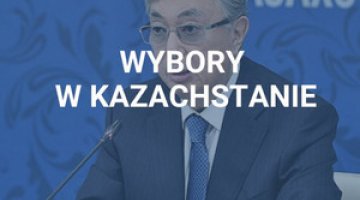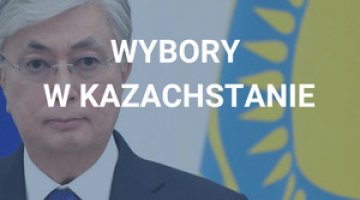Analyses
Strikes in Kazakhstan are growing
Since the end of May, Kazakhstan’s Mangistau region, located on the Caspian Sea, has been the location of a strike by several thousand people, mostly employees of the state company KazMunaiGaz Exploration & Production (E&P), which belongs to the KazMunaiGaz holding company. This strike is unprecedented in its duration and scale, and it has hit both Kazakhstan’s strategic oil sector and KazMunaiGaz, which is the most important state-owned company. The responses from both the company and the government have been ineffective and have only exacerbated the protests. This prolonged strike is undermining the image Kazakhstan’s government has created of a stable country, the most economically prosperous in the region; and it illustrates the ruling elite’s inability to deal with social tensions. The continuation and radicalisation of the protest may lead to an escalation of social tensions in the country before the upcoming parliamentary elections.
Strikes
The strikes began on 26 May in the Uzenmunaigaz and Karazhanbasmunai companies (the latter a joint venture with China's CNPC), two subsidiaries of Kazakhstan’s most important company KazMunaiGaz E&P. The employees of these companies were joined on strike by workers from other companies in the region. The strikers number some thousands of people (according to various reports, the amount varies from 4,000 to 15,000), but there is no precise and reliable information on the scale of the strike. In Kazakh law, the strike is illegal, as it has been organised by independent trade unions which have not been recognised by the government. The strikers’ demands include higher wages (the basic demand that initially caused the strike), the recognition of the independent trade unions, and the workers’ right to choose the leaders of the government-sanctioned trade unions.
The attempts to resolve the conflict by both the company’s management and the government (including the establishment of a trilateral committee – which did not include members of the independent unions – and offering new jobs for the sacked workers) have had no effect; nor have attempts to stifle the protests (including breaking up pickets in front of the government’s offices in the town of Uzen, and sentencing Natalia Sokolova, a lawyer who had been advising the strikers, to six years in a penal colony). What is more, new demands have been put forward, and further protests have been held. The strikers have added the release of Sokolova to their list of demands; also, about a thousand people have given up their membership in the ruling, pro-presidential Nur Otan party as an act of protest, and there have been pickets in front of the party’s headquarters in Almaty. Thus, even though the protesters have not raised any specifically political demands, the strike has taken on a political dimension, which is inconvenient for the authorities in the context of the upcoming parliamentary elections (these are scheduled for 2012, but earlier this year there had been thoughts of moving them up to 2011).
Consequences
The most tangible consequence of the prolonged strike is the economic loss. KazMunaiGaz E&P has announced that oil production will fall by 6% this year, which will certainly negatively affect the company’s price on the London Stock Exchange.
Kazakhstan’s government is unable to completely block independent information about the strikes (for example, the Russian TV channel K+, which often produces inconvenient reports about President Nursultan Nazarbayev and his entourage, can be received by satellite in Kazakhstan), so it is likely that information about the strikes in KazMunaiGaz E&P has had an impact on workers in other companies; this summer, employees of the Italian company building Kazakhstan’s section of the Russia-China highway went on strike.
The strikes have also had a negative impact on Kazakhstan’s image as a stable and modern state, an image which has carefully and consistently been built up by the authorities, and is of great importance to Nazarbayev himself. In July, the famous singer Sting cancelled a planned concert in Astana in a gesture of support for the strikers, a move which was widely echoed in the global media. However the ongoing strikes are not expected to have a fundamentally negative impact on those investors who see Kazakhstan as an attractive place to invest because of the wealth of energy resources and the country’s relatively favourable investment climate.
At this stage, the strikes are not jeopardising Kazakhstan’s stability, but they have undermined the unwritten social contract between the government and society, and have called into question the effectiveness of the existing system. Kazakhstan is a state with authoritarian characteristics, with a particular role for the person of President Nazarbayev. The state’s stability has largely been associated with its undisputed economic development and modernisation, the price for which has been the total control of political and economic life by a small elite. In this context, any spontaneous self-organisation of society outside the current system is dangerous for the authorities. The elite’s actions show that they seem aware of the seriousness of the problem, but they have no idea how to deal with it effectively.
The continuation of the strike and of similar social tensions may affect the coming elections, if the strikes form a basis for a new political force (which is far from certain), or the strikes were to be exploited by interest groups within the ruling elite (which is more likely – the opposition abroad has already started publicising the strikes in Kazakhstan). In the longer term, rising social tensions, and their possible politicisation, would complicate the process of arranging the succession of power after Nazarbayev, which is supposed to take place in a peaceful way, as a result of consensus among the elite, and not lead to social unrest. The current strikes could be exploited (for example, by part of the foreign-based elite which opposes Nazarbayev) to strike at the authority of the main pretender to the succession, the president’s son-in-law Timur Kulibayev, who for many years has been indirectly managing the affairs of KazMunaiGaz.



